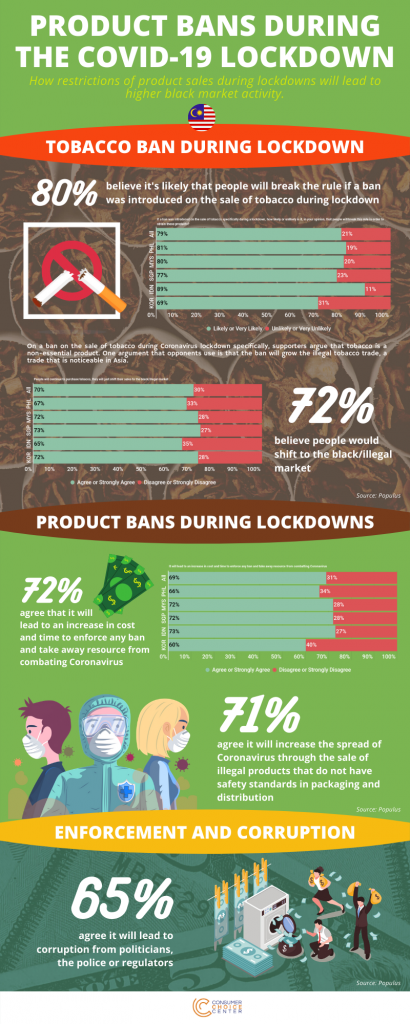The ban on cigarette sales during the MCO has increased the sale of contraband products which could have been averted, says industry player.
KUALA LUMPUR, May 6, 2020 — A blanket cigarettes sale ban during the Movement control order (MCO) gave the black market for tobacco a boost.
This is what a public opinion poll shows. It says a majority of Malaysians believe the cigarettes sale ban was negative.
The latest Asia Pacific survey saw over 1000 adults responding in Malaysia. It was commissioned by the advocacy group, the Consumer Choice Center (CCC).

The leading independent polling company, Populus was responsible for the fieldwork. It found that:
- Eight out of ten Malaysian adults (80%) agrees that people would defy a ban on tobacco sale during a lockdown. They would go to great length to get the products.
- Almost three-quarters of all respondents (72%, and 78% of smokers) agrees that people would continue to purchase tobacco products, but that sales would shift to black/illegal markets.
- Unsurprisingly, most Malaysians (58%) thought a restriction would encourage people to quit.
- 71% agrees that prohibition could increase the spread of coronavirus. They say the illegal sale of products that do not meet safety standards in distribution is risky.
- the spread of Coronavirus through the sale of illegal products that do not meet safety standards in distribution.
Fred Roeder, Managing Director of the Consumer Choice Center says,“Our research clearly shows that people will still smoke and will likely go to great lengths to find alternative supply whenever theirs runs dry.
“Under restrictive MCO measures, encouraging unnecessary movement put lives at risk by increasing the chances of contracting and transmitting Covid-19.”
Roeder says the MCO caused a disruption in the distribution of legal cigarettes.
This resulted in an explosion of illicit cigarette trade, as highlighted by the relevant authorities in recent news reports.”
The vast majority of respondents (72%) say the ban on the sale of tobacco diverts vital resources from combatting Covid-19. They cite the increase in enforcement cost and time.
“Malaysian enforcement authorities have recently expended plenty of resources to counter illicit trade. There were roadblocks and thorough checks on food couriers and e-hailing service providers.
Nevertheless, this was the cause of unnecessary delays in an already difficult situation,” explains Roeder.
“While the initiative to encourage people to stop smoking during MCO is well-intentioned, it was a failure. Instead, this move has enriched transnational criminal syndicates and corrupt facilitators while reinforcing the endemic presence of illegal cigarettes in Malaysia,” he says.
“As Malaysia enters the phase of conditional MCO, the resumption of normal sales by legitimate players may not be enough to break the stranglehold on the market that illicit traders have gained over the last one-and-a-half months.”
He says there is a need for more effort, be it through bold policies and stricter enforcement to control this scourge effectively.
CCC conducted the survey in five countries in the Asia Pacific region including Malaysia, Singapore, Indonesia, Philippines and South Korea.
Originally published here.
The Consumer Choice Center is the consumer advocacy group supporting lifestyle freedom, innovation, privacy, science, and consumer choice. The main policy areas we focus on are digital, mobility, lifestyle & consumer goods, and health & science.
The CCC represents consumers in over 100 countries across the globe. We closely monitor regulatory trends in Ottawa, Washington, Brussels, Geneva and other hotspots of regulation and inform and activate consumers to fight for #ConsumerChoice. Learn more at consumerchoicecenter.org


